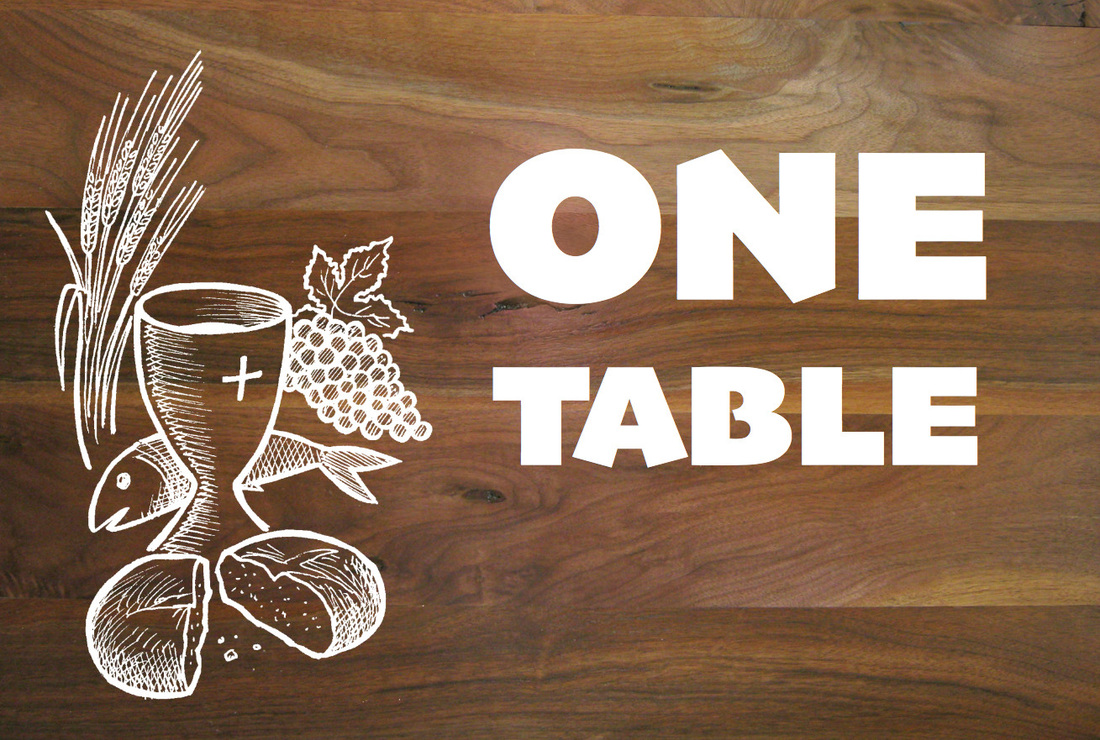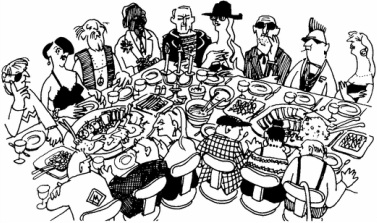Radical InclusivityJesus was willing to share a meal with anyone, no matter how different. In fact, he reached out to those who were different: the outcasts, all kinds of sinners, the rich and poor, friends and strangers. Jesus' tablemates didn't have to earn their place, reform themselves, or pass some test. They just had to show up.
Today, as we follow Jesus in our own lives, we are invited to One Table: Jesus' table. And we are invited to share it with everyone, as Jesus did. This is a challenge both within our church community and in our everyday lives. |
Sharing a Table
Jesus' call for radical social restructuring at all levels, from the household (Mark 3:31-35) to the body politic (Mark 10:35-45), is summarized by the Jubilee ultimatum: "Many who are first will be last, and the last first" (Mark 10:31). Ched Myers, "Jesus' New Economy of Grace"
|
The eucharistic table presents itself as the one place in our society where at least this much of God's kingdom is anticipated: where everyone is welcome, where those who are elsewhere unwelcome, outcasts, despised, oppressed, shunned, excluded are the most welcome of all. Robert W. Hovda
By this time a lot of men and women of doubtful reputation were hanging around Jesus, listening intently. The Pharisees and religion scholars were not pleased, not at all pleased. They growled, “He takes in sinners and eats meals with them, treating them like old friends.” Luke 15:1-3, The Message
Food, like sex, unites all creatures at the level of both need and pleasure. But the sharing of food, like friendship itself, is potentially a more inclusive phenomenon than sex, for food can be shared with any other and with all others. As we have noted, Jesus' table fellowship with the outcasts of society, his eating with them as a friend, epitomized the scandal of inclusiveness for his time, for he invited the others that were rejected to the fellowship of a meal. Moreover, this table fellowship became both a symbol of a messianic banquet, where all would feast together in joy, and a precursor of the sacrament of the eucharist. Thus, Jesus' invitation to the outsiders to join him as friends at the table became an enacted parable of God's friendship with humanity: the God of Jesus is the One who invites us to table to eat together as friends. Sallie McFague
|
Catholic Inclusivity
|
by Fr. Ron Rolhaieser, OMI
There’s a disturbing trend within our churches today. Simply put, we are seeing the embrace of our churches become less-and-less inclusive. More-and-more, our churches are demanding a purity and exclusivity not demanded by Jesus in Gospels.
Indeed the very word ‘inclusivity’ is often glibly dismissed as being part of the ‘I am spiritual but not religious’ ethos, as if being inclusive were some kind of light-weight, New-Age, thing rather than a central demand within Christian discipleship itself. What does it mean to be inclusive? We can begin with the word ‘Catholic’: The opposite of being ‘Catholic’ is not being ‘Protestant’. The opposite of ‘Catholic’ is being narrow, exclusive, and overly-selective in our embrace. The opposite of being ‘Catholic’ is to define our faith-family too-narrowly. ‘Catholic’ means wide, universal. It means incarnating the embrace of an abundant and prodigal God whose sun shines on all indiscriminately, the bad as well as the good. Jesus once defined this by saying: “In my father’s house there are many rooms.” God’s heart is wide, abundance, prodigal, and universally-embracing, a heart that takes care to pray for those “other sheep who are not of this fold”. To be ‘Catholic’ is to imitate that. |
In the Gospels we see that Jesus’ passion for inclusivity virtually always trumps his concern for purity and worthiness. He associates and dines with sinners without setting any prior moral conditions that have to be met before those sinners are deemed worthy of his presence. His disciples, much like many good sincere church-people today, were forever trying to keep certain people away from him because they deemed them unworthy; but Jesus always protested that he didn’t need that kind of protection and that, indeed, he wanted them all to come to him: Let them come to me! Indeed, that is still Jesus’ call: Let them come to me, all of them!
Read more at The Irish Catholic Catholic means James Joyce, Finnegan's Wake
|
A Culture of Encounter
We must be able to reach out to each other. We must build, create, construct a culture of encounter. How many differences, family troubles, always! Trouble in the neighborhood, trouble at work, trouble everywhere. And these differences do not help. The culture of encounter. Reaching out to encounter each other. And the theme says, "Reaching out to those most in need", in short, with those who need me. With those who are going through a bad time, far worse than what I'm going through.
There is always someone who is having [it] worse, eh? Always! There is always someone. So, I think, "I'm going through a bad time, I line up to encounter... Jesus and then go out to encounter others, because there is always someone who is having it worse than me." To these people, it is to these people that we have to reach out.
Then Jesus turned to the host. “The next time you put on a dinner, don’t just invite your friends and family and rich neighbors, the kind of people who will return the favor. Invite some people who never get invited out, the misfits from the wrong side of the tracks. You’ll be—and experience—a blessing. They won’t be able to return the favor, but the favor will be returned—oh, how it will be returned!—at the resurrection of God’s people.” Luke 14:12-14, The Message
|
Three Challenges of Gospel Inclusivity
Accept InvitationsRealize first that Jesus welcomes you and loves you, period. No matter who you are or what you may have done, the door is always open. The Church also welcomes you on the same terms.
When someone reaches out to you, be sure to respond. When someone asks you for help, recognize it as an opportunity. The right response may or may not be exactly what the person asked for, but do your best to find it. |
Remove BarriersWe are all systematically separated from people who are different from us. This can make it a rare occurrence to even come in contact with people who we are called to invite into our lives.
Take a step toward embracing a "culture of encounter" in your life. What walls separate you from others, especially those different from you? For example, Caille Millner argues that many people avoid public transportation to avoid poor people, whether they admit it or not. |
Make InvitationsFind ways to reach out to individuals who are different from you or in need and make a connection. You can start small: make eye contact or say hello. Invite a person or family over for dinner. Or aim higher: have a private party to bring many people together, or even organize a block party.
Invite someone to your church, perhaps someone who you know is Catholic but no longer regularly practices. Make sure they know they are welcome, no matter how long they have been gone or what they may have done. |
ACTION STEPS
Here are some ideas for how you can live out this message in your life this week.
Question of the WeekWhat kind of people do you exclude from your life? How might you take a step in including them?
Reflect on the ChallengesReview the "Three Challenges of Gospel Inclusivity" above. What concrete step can you take for each one?
|
For Families With ChildrenThis is a good opportunity for families to discuss bullying, and how children can best respond to it (and not just be a bystander). Parents can also initiate a discussion of how to being Christian means welcoming the outsiders-- the new kid, the uncool kid, the shy kid--and helping them be part of the community.
Share This Page!Share this page with family members or friends you think would appreciate it.
|
Get Updates |
Feedback |






